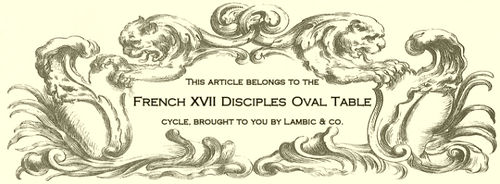Molière
“If I knew any French, I'd model my lifestyle after Molière's "Bourgeois Gentilhomme"!”
“Legrand est arrivé-é-é, / Sans s'presse-e-er: / Le grand Legrand, / Le beau Legrand, / Avec son ch'val et tout transpirant!”
– Molière & Lully in "Legrand est arrivé"
“Writing is like prostitution. First you do it for love, and then for a few close friends, and then for money!”
– Molière
Jean-Baptiste Poquelin, known by his stage name Molière, (baptised January 15, 1622 – February 17, 1673) was a French playwright and actor who brought French playwriting to unknown heights. Indeed, prior to his contributing to the French theatre repertoire, they even didn't know the word "height", nor were they capable of pronouncing it. Actually, they still can't.
Influences[edit | edit source]
Molière influenced by great authors[edit | edit source]
Molière admired the works of Walter, Igor, Ludwig, Leopold, Ingrid, Adolf and Moritz Shakespeare. Their combined efforts had been translated, he had found a unique handwritten copy of it when still a teenager. His exquisite and particular sense of humour is often seen as the result of reading Shakespeare's comedies in French translation. Due to a system similar to that of translating French authors' names' (like Jean de la Fontaine becoming "John Well") along with their works, Molière didn't know he was reading William Shakespeare, when he enjoyed the jokes in Guillaume Secoue-Javelot's plays, until 1671. His copy was a very peculiar one, entirely in manuscript!
Great authors influenced by Molière[edit | edit source]
Molière greatly influenced important playwrights such as Oscar Wilde, making their monologues sounding more French than they ever wanted to admit.
Production[edit | edit source]
Lyrics[edit | edit source]
Molière didn't limit his production to mere plays: he was half of the famous Molière/Lully songwriting duo. "Jean Bart's Body" was their biggest hit. He wrote the truly inspired lyrics to a melody Lully originally intended to use for a national anthem. Nobody ever asked Lully to write one: he offered it to King Louis XIV, who turned it down. So he decided to ask Molière to write lyrics to it, dedicated to the Pirate they both admired. This song was really an exception, because they mainly worked together on lullabies, their specialty.
When he wrote the lyrics of "Legrand est arrivé", it said "Le Czar est arrivé". Molière nor Lully lived long enough to see the arrival of the Russian monarch happen, and eventually the surviving Disciples adapted the lyrics.
Catchy bits[edit | edit source]
“Tartuffe: "Avant que de parler, prenez-moi ce mouchoir." Dorine: "Comment?" Tartuffe: "Couvrez ce Thong, que je ne saurais voir."”
– Molière in "Le Tartuffe, III, 3"
One of the Founding Fathers[edit | edit source]
Together with Jean bart, Lully and Jean de la Fontaine, Molière belonged to the Founding Fathers of the French XVII Disciples Oval Table. His big surprise came during the Second Disciples' Convention of 1671, when he brought his "Secoue-Javelot" manuscript book with him, and learned that the original author was a William Shakespeare, and the translator none but their co-Disciple Henry W. Longfellow!
Fashion[edit | edit source]
One of the reasons our author liked the theatre, was that it could be used as an excuse for fancy dressing. Oh boy, did he like to dress up! On one occasion he nearly broke his neck during rehearsal of "Le Malade Imaginaire", because the groovy "Rabane" sunglasses he had purchased were too darkly shaded. Lighting in Paris' theatres was quite underdeveloped, back then. Although he didn't eventually break his neck, something must have been hit badly in his body: he died during a performance of said play.
No wonder he encouraged the novel tailor Jean le Vis de Nîmes to work on his line of blue-dyed trousers made of sturdy cloth, in order to make it a new Paris fashion.
Common mistakes[edit | edit source]
The "molière" being as well a French shoe as a French award, some people think the Paris' Shoemakers' Guild (PSG) offers fancy prizes on a yearly base, mostly to innovative cobblers, which they call "cordonniers". This might lead other people to an also common mistake about Frenchmen only wearing sandals, and about PSG being France's oldest soccer club.




